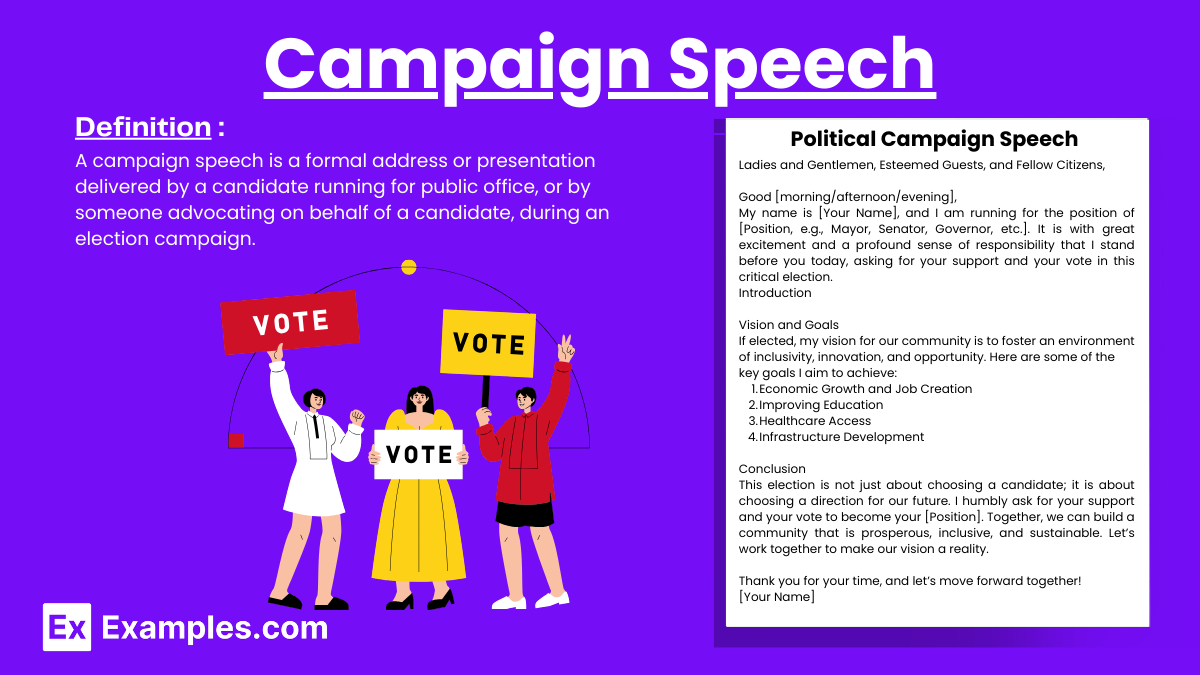3+ Campaign Speech Examples to Download
A campaign speech is a formal address or presentation delivered by a candidate running for public office, or by someone advocating on behalf of a candidate, during an election campaign. The primary purpose of a campaign speech is to persuade voters to support the candidate by outlining their platform, vision, policies, and qualifications.
What is Campaign Speech?
A campaign speech is a formal address delivered by a candidate running for public office or by someone advocating on behalf of a candidate. The primary purpose of a campaign speech is to persuade voters to support the candidate in an upcoming election. This type of speech is used to communicate the candidate’s platform, vision, policies, qualifications, and values. It serves to connect the candidate with the electorate, address key issues, and mobilize support.
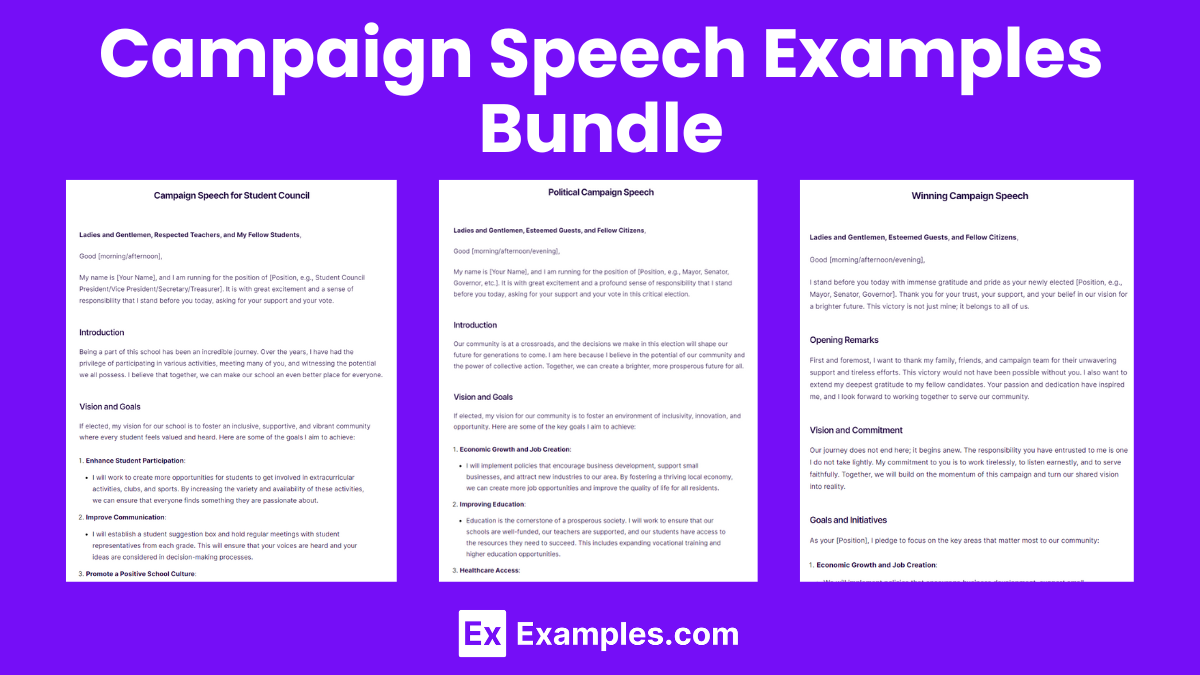
Campaign Speech Bundle Download
Campaign Speech Format
Introduction
Greeting: Start with a warm greeting to the audience.
Self-Introduction: Introduce yourself and your candidacy.
Purpose: State the purpose of your speech.
Example: “Good evening, everyone. My name is [Your Name], and I am running for [Position]. I am here to share my vision for our community and ask for your support.”
Personal Background
Qualifications: Highlight your relevant experience and background.
Personal Story: Share a brief personal story that connects with the audience.
Example: “I have lived in [Community] for [number] years and have dedicated my career to [mention relevant experience].”
Platform and Policies
Key Issues: Identify key issues or problems you aim to address.
Policy Proposals: Present your proposed solutions and policies.
Benefits: Explain how these policies will benefit the community.
Example: “One key issue we need to address is [issue]. I propose [solution] because it will [benefits].”
Vision and Goals
Vision: Articulate your vision for the future.
Goals: Outline specific goals and how you plan to achieve them.
Example: “My vision for [Community] is [describe vision]. My goals include [list goals] and I plan to achieve them by [how].”
Connection with the Audience
Shared Values: Emphasize shared values and common goals.
Engagement: Engage with the audience, addressing their concerns.
Example: “I know many of you share my concerns about [issue]. Together, we can make a difference.”
Call to Action
Vote: Urge the audience to vote for you.
Involvement: Encourage them to get involved in your campaign.
Example: “I ask for your vote on [Election Day]. Join me in this journey by volunteering and spreading the word.”
Conclusion
Summary: Summarize the main points of your speech.
Closing Statement: End with a strong, memorable closing statement.
Example: “Thank you for your support. Let’s build a brighter future for [Community] together. Remember to vote on [Election Day]. Thank you.”
Campaign Speech Example
Introduction:
“Good evening, everyone. My name is [Your Name], and I am running for [Position]. I am here today to share my vision for our community and to ask for your support in this upcoming election.”
Personal Background:
“I have lived in [Community] for [number] years and have seen firsthand the challenges and opportunities we face. As a [mention your profession or background], I have dedicated my career to [mention relevant experience], and I am passionate about making a difference in our community.”
Platform and Policies:
“One of the key issues we need to address is [issue]. I propose [policy/solution] because it will [explain benefits]. For instance, implementing [specific policy] will lead to [positive outcomes, such as improved public safety, better schools, more job opportunities]. Additionally, I am committed to [another issue] and plan to [propose solution]. These changes will lead to [positive outcomes].”
Vision and Goals:
“My vision for [Community/Position] is one where [describe vision, e.g., ‘every child has access to quality education, every family feels safe, and every individual has the opportunity to succeed’]. My goals include [list specific goals, e.g., ‘improving our schools, increasing job opportunities, and enhancing public safety’], and I have a clear plan to achieve them through [explain how, e.g., ‘collaborative efforts with local businesses, securing funding for community programs, and implementing new safety measures’]. I believe that together, we can make our community a better place for everyone.”
Connection with the Audience:
“I know that many of you share my concerns about [issue]. Together, we can work towards a better future. Your voices matter, and I am here to listen and act on your behalf. I want to create a community where we all feel valued and heard.”
Call to Action:
“I am asking for your vote on [Election Day] because I believe in [Community/Position]’s potential. Join me in this journey by volunteering for my campaign and spreading the word about our vision for change. Together, we can achieve great things.”
Conclusion:
“Thank you for your time and support. Let’s work together to build a brighter future for [Community/Position]. Remember to vote on [Election Day], and let’s make a difference together. Thank you.”
Campaign Speech Short Example
Introduction:
“Good evening, everyone. My name is Alex Johnson, and I am running for City Council Member for District 5. I’m here to share my vision for our community and to ask for your support.”
Personal Background:
“I have lived in District 5 for 20 years and have seen both its challenges and its potential. As a small business owner and community volunteer, I am passionate about making a meaningful difference in our community.”
Platform and Policies:
“One key issue is public safety. I propose increasing funding for our police and fire departments and implementing community policing to build stronger relationships between law enforcement and residents.
Another priority is improving our local schools. By securing more funding for educational programs, we can provide our children with the quality education they deserve.
I also aim to support local businesses by providing tax incentives and creating job training programs to strengthen our economy and create more job opportunities.”
Vision and Goals:
“My vision for District 5 is one where every child has access to quality education, every family feels safe, and every individual has the opportunity to succeed. Together, we can make District 5 a better place for everyone.”
Call to Action:
“I ask for your vote on November 6th. Join me in this journey by volunteering for my campaign and spreading the word about our vision for change. Together, we can achieve great things.”
Conclusion:
“Thank you for your time and support. Let’s work together to build a brighter future for District 5. Remember to vote on November 6th. Thank you.”
Campaign Speech for Student Council
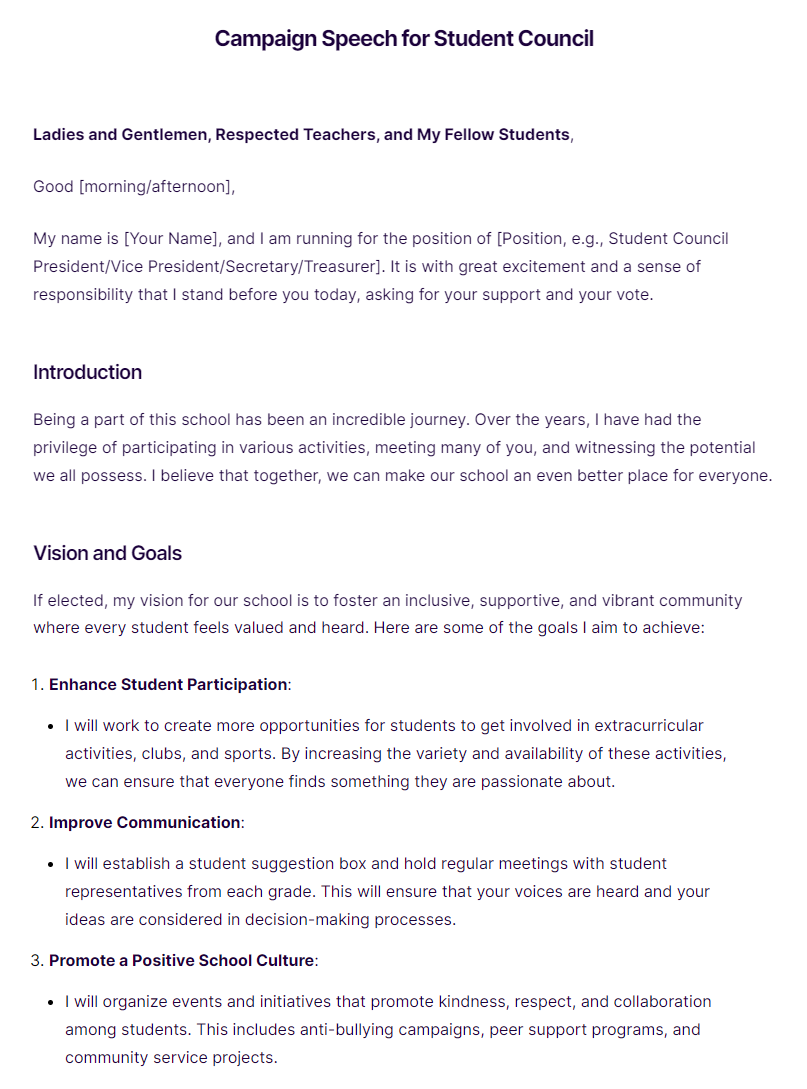
Political Campaign Speech
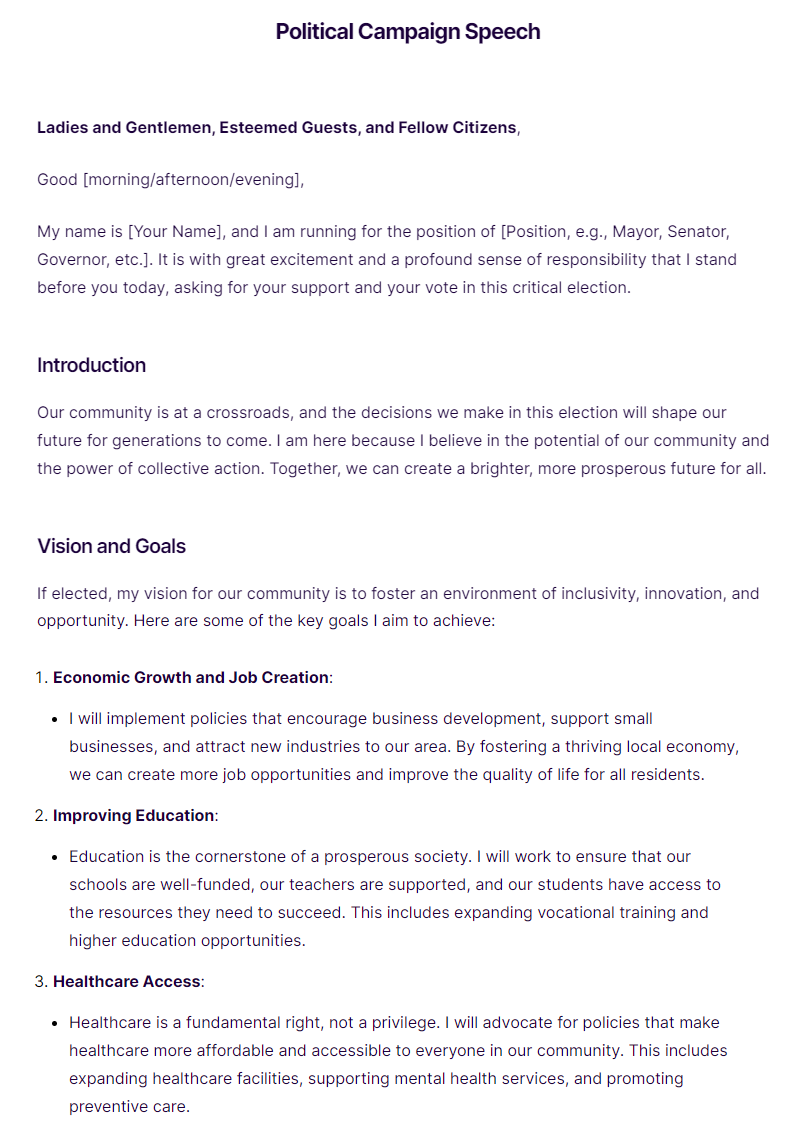
Winning Campaign Speech
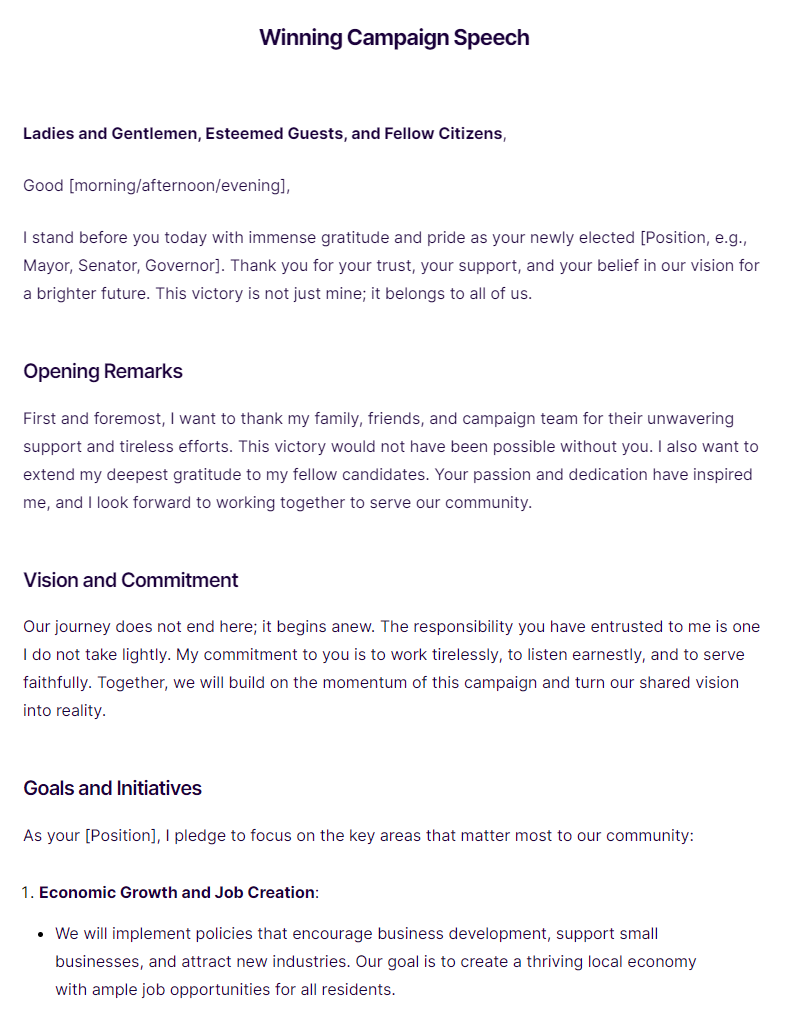
How to Write Campaign Speech
1. Start with a Strong Opening
- Greeting: Begin with a warm greeting to the audience.
- Self-Introduction: Introduce yourself and your candidacy.
- Purpose: Clearly state the purpose of your speech.
2. Provide Personal Background
- Qualifications: Highlight your relevant experience and background.
- Personal Story: Share a brief personal story that connects with the audience.
3. Present Your Platform and Policies
- Key Issues: Identify the key issues or problems you aim to address.
- Policy Proposals: Present your proposed solutions and policies.
- Benefits: Explain how these policies will benefit the community.
4. Articulate Your Vision and Goals
- Vision: Articulate your vision for the future.
- Goals: Outline specific goals and how you plan to achieve them.
5. Connect with the Audience
- Shared Values: Emphasize shared values and common goals.
- Engagement: Engage with the audience, addressing their concerns.
6. Call to Action
- Vote: Urge the audience to vote for you.
- Involvement: Encourage them to get involved in your campaign.
7. End with a Strong Conclusion
- Summary: Summarize the main points of your speech.
- Closing Statement: End with a strong, memorable closing statement.
Tips for Campaign Speech
- Know Your Audience:
- Understand the concerns and interests of your audience.
- Tailor your message to resonate with them.
- Start Strong:
- Open with a compelling greeting or a memorable quote.
- Introduce yourself clearly and state your purpose.
- Be Clear and Concise:
- Keep your message focused and to the point.
- Avoid jargon and complicated language.
- Highlight Key Issues:
- Identify the main issues you want to address.
- Explain why these issues are important to you and the community.
- Present Solutions:
- Offer clear and practical solutions to the issues.
- Explain how your policies will benefit the community.
- Share Personal Stories:
- Include anecdotes that illustrate your commitment and values.
- Make a personal connection with the audience.
- Be Passionate and Authentic:
- Speak from the heart and show your enthusiasm.
- Be genuine and sincere in your delivery.
- Engage with the Audience:
- Ask rhetorical questions or involve the audience in your speech.
- Show that you are listening and care about their concerns.
- Call to Action:
- Clearly ask for the audience’s support and their vote.
- Encourage them to get involved in your campaign.
- Practice and Prepare:
- Rehearse your speech multiple times.
- Time yourself to ensure it fits within the allotted time.
- Use a Strong Conclusion:
- Summarize your main points.
- End with a powerful and memorable closing statement.
Uses of Campaign Speech
- Political Campaigns: In political campaigns, a speech helps candidates connect with voters, outline their platforms, and distinguish themselves from opponents. It’s an opportunity to address key issues, propose solutions, and build trust with the electorate.
- Student Elections: During student council or class president elections, campaign speeches allow candidates to present their ideas and plans to their peers. This helps students make informed decisions based on the candidate’s vision and commitment.
- Community Advocacy: Activists and community leaders use campaign speeches to rally support for causes like social justice, environmental protection, or public health initiatives. These speeches aim to mobilize community members, raise awareness, and encourage collective action.
- Nonprofit Fundraising: In nonprofit organizations, campaign speeches are used during fundraising events to inspire donations and support. By highlighting the organization’s mission, achievements, and future goals, speakers can connect emotionally with potential donors and secure financial backing.
- Corporate Leadership Elections: In corporate settings, candidates for leadership positions use campaign speeches to outline their vision for the company’s future, address challenges, and propose strategies for growth and improvement. This helps stakeholders assess the candidate’s suitability for the role.
- Product Launches: Companies use campaign-style speeches during product launches to generate excitement and interest. By presenting the product’s features, benefits, and market potential, speakers can persuade potential customers and investors of its value.
- Policy Advocacy: Advocates use campaign speeches to promote specific policies or legislative changes. By presenting evidence, personal stories, and compelling arguments, they aim to influence public opinion and policymakers.
- Social Media Campaigns: In the digital age, campaign speeches are also delivered via social media platforms. These speeches can reach a broader audience, engage with diverse communities, and encourage online activism and support.
Why are campaign speeches important?
A campaign speech is a public address given by a candidate to communicate their policies, values, and goals to voters.
How should you start a campaign speech?
Start with a compelling hook or story to grab attention and connect emotionally with the audience.
What are key elements of a campaign speech?
Key elements include a clear message, strong opening, persuasive arguments, personal stories, and a call to action.
How long should a campaign speech be?
A campaign speech should be concise, ideally between 10 to 20 minutes, to maintain audience engagement.
How do you write a campaign speech?
Write a campaign speech by outlining main points, incorporating personal stories, and practicing clear, confident delivery.
What makes a campaign speech effective?
An effective campaign speech is clear, persuasive, relatable, and delivered with confidence and passion.
How can you connect with the audience in a campaign speech?
Connect by addressing audience concerns, using relatable language, and sharing personal experiences.
How do you end a campaign speech?
End with a powerful summary, a clear call to action, and a memorable closing statement.
What role does body language play in a campaign speech?
Body language enhances communication by reinforcing messages, showing confidence, and engaging the audience.
How can you handle nervousness during a campaign speech?
Handle nervousness by practicing thoroughly, focusing on the message, and engaging with the audience.



